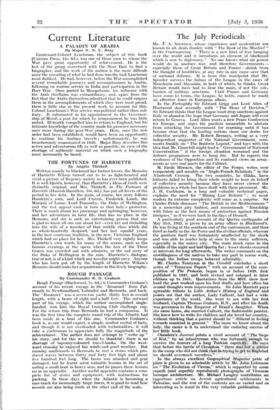The July Periodicals -
MR. J. A. SPENDER, whose experience and moderation are known to all, deals frankly with " The Root of the Mischief " in the Contemporary. There is a new kind of fear hanging
over the world and it introdudes an element of blackmail which is new to diplomacy." No one knows what air power
would do another war, and therefore Governments—
especially those of Great Britain and France—shrink from the thought of hostilities, at any rate in any cause save that of national defence. It is from this standpoint that Mr.
Spender surveys the failure of the League in the cases of Manchuria and Abyssinia, in both of which, he thinks, Great
Britain would have had to hear the main, if not the sole, burden of military sanctions. Until France and Germany have come to terms, the League, he holds, cannot be made an effective force in European affairs.
In the Fortnightly Sir Edward Grigg and Lord Allen of Hurtwood deal severally with " The Hour of Decision."
Sir Edward thinks that the League must drop sanctions against Italy or abandon the hope that Germany and Japan will ever return to Geneva. Lord Allen wants a new Peace Conference for Europe, and urges the pacifists meanwhile to abstain from attacking the Government for rearming until it has become clear that the leading nations share our desire for collective security. Mr. Robert Bernays, writing as a very independent supporter of the National Government, com- ments frankly on " The Baldwin Legend," and toys with the idea that Mr. Churchill might lead a " Government of National Concentration " if the foreign situation worsened and the defence programme were to hang fire. But he regards the weakness of the Opposition and its confused views on arma- ments as very real assets for the Cabinet.
M. Emile Mireaux, the editor of the Temps, writes very temperately and sensibly on "Anglo-French Relations " in the Nineteenth Century. The two countries, he tilrnlf., have hitherto failed to bring their whole weight to bear on behalf of collective security because they have never viewed the
problems as a whole but.have dealt with them piecemeal. Mr.
J. H. Cockburn, in a long and valuable technical paper, explains the need for " Mining Law Reform " ; to most readers its extreme complexity will come as a surprise. Sir Charles Petrie discusses The British in the Mediterranean " in a somewhat airy. fashion, . and _recommends "friendship with Islam as the best means of protection against Russian intrigues," as if we were back in the days of Disraeli.
A particularly good account of the Quetta earthquake of May 31st, 1935, is given by an army officer in Blackwood's.
He was living at the southern end of the cantonment, and thus fared as badly as the Air Force and the civilian officials, whereas the garrison itself was fortunately unaffected by the shock and was able to render help at once to the many sufferers, especially in the native city. The main shock came in the middle of the night and laid Quetta flat ; lesser shocks occurred
at intervals for long afterwards. The writer comments" on the unwillingness of the natives to take any part in rescue work, though the Indian troops behaved admirably.
Mr. Charles Tennyson in the Cornhill concludes a short series of " Tennyson Papers " with an account of the com- position of The Princess, begun in or before 1839; first
published in 1847, and both revised and enlarged in later editions up to 1851. Quotations from the MSS. show how hard the poet worked upon his first drafts and how often his
second thoughts were improvements. Sir John Marriott pays agreeable tribute to Little Arthur's History of England and
points out that the author, Lady Callcott, had had a wide experience of the world. She went to sea with her first !husband, Captain Thomas Graham, R.N., and after his death iwas governess to the Emperor of Brazil's daughter. When she came home, she married Callcott, the fashionable painter. She knew how to write for children and she loved her country, without thinking that a patriot should be " illiberal in feeling towards mankind in general." The more we know about the !lady, the easier is it to understand the enduring success of her little book.
1: Chambers's Journal prints a vivid account cof ",The Siege of Kut," by an infantryman who was fortuna 'enough to :survive the horrors- of a long Turkish cap : ,; He says
that before the battle Of Cfesiphon " there yitas- t a seddier in the camp who did not think. hatin-trying to get, to Baghdad 'we should overreach ourselves." •
1 In the always excellent Geographical Magazine pride of :klace is given to an admirable article by Air. John Lehmann on " The Evolution of Vienna," which is supported by some superb (and superbly reproduced) photographs of Viennese baroque architecture. Mr. Michael Langley contributes an !opportune article on Jewish agricultural settlements in iPalestine, and the rest of the contents are -as varied and as interesting as is usual in this very valuable publication.














































 Previous page
Previous page